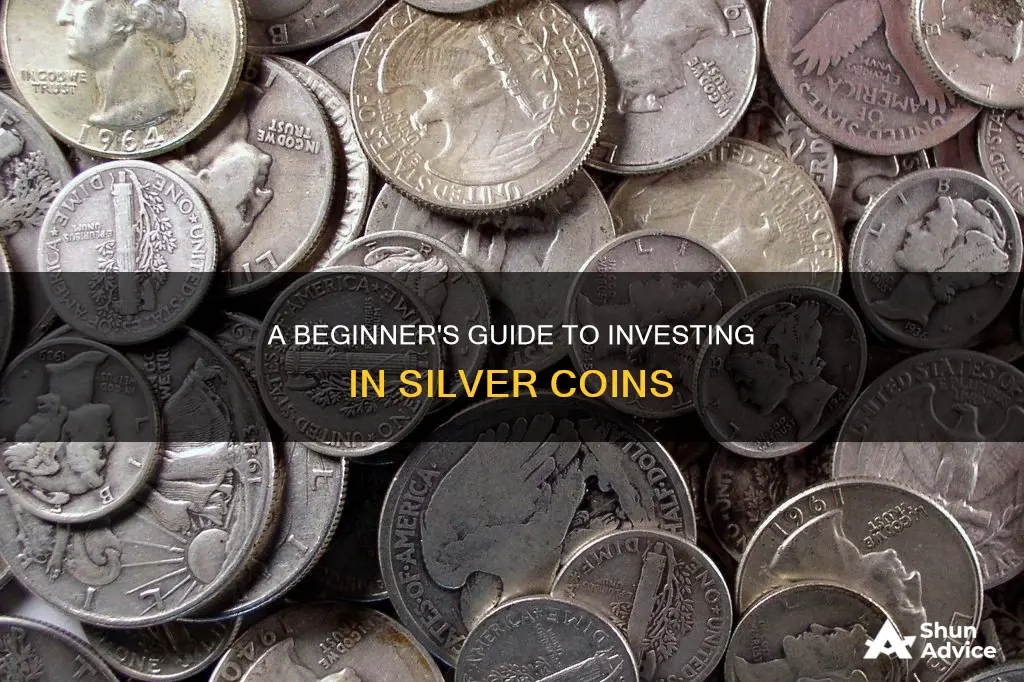
Silver has been used as currency throughout history, and its price fluctuates based on supply and demand. Investing in silver coins can be a good way to diversify your portfolio, as precious metals have historically had a low correlation to traditional investments. There are several ways to invest in silver coins, including buying them directly from dealers or mints, investing in silver mining companies, or purchasing silver-tracking ETFs. It's important to do your research and understand the advantages and disadvantages of each option before investing.
| Characteristics | Values |
|---|---|
| Reasons to Invest in Silver | Silver is a tangible asset that has historically served as an effective hedge against inflation. It is also a store of value, highly liquid, private and confidential, and cannot be hacked or erased. |
| Types of Silver Coins | Bullion coins, Numismatic coins, Semi-Numismatic Coins, Junk silver, Rounds |
| Best Silver Coins to Buy | Sovereign bullion coins, Rare coins, Silver proofs, Semi-numismatics |
| Where to Buy Silver Coins | Local coin shop, Online, Local dealer, eBay, Coin shows, Banks |
What You'll Learn

Silver bullion coins vs. numismatic coins
Silver bullion coins and numismatic coins are two types of silver coins available for investment. Both types of coins are minted using the finest metals, rarely cut with anything else. However, there are some key differences between the two.
Bullion coins are acquired for their precious metal content and are often available at lower prices. Their weight is expressed as an even amount, such as 1-ounce, 1/2-ounce, or even grams. Examples of bullion coins include Canadian Gold and Silver Maples, South African Krugerrands, and 90% Junk Silver (pre-1965 half-dollars, quarters, and dimes). Bullion coins are typically purchased as an investment, inflation hedge, or survival. They are widely circulated and bought in bulk, making them a good option for investors looking for a hedge against inflation.
On the other hand, numismatic coins are considered collectibles and are valued for their rarity and historical value. Their value is based on factors such as the condition of the coin, its rarity, where it was produced, and to a lesser extent, the precious metal content. Examples of numismatic coins include pre-1933 $20 and $10 Eagle coins and Peace Silver Dollars. Numismatic coins are sought after by collectors and are not typically considered an investment in the traditional sense.
When deciding whether to invest in bullion or numismatic coins, it is important to consider your primary objectives. If you are primarily interested in investing for your future or hedging against inflation, bullion coins may be the better option. On the other hand, if you are interested in coin collecting or owning a piece of history, numismatic coins may be more appealing. It is also worth noting that numismatic coins tend to carry larger risks and higher premiums, as their value is largely determined by the laws of supply and demand.
A Beginner's Guide to Investing in Bitcoin
You may want to see also

Silver as a hedge against inflation
Silver has historically been viewed as a "poor man's gold", sharing many of the same attributes as its more expensive cousin. Silver can be a good hedge against inflation, especially over the long term.
When the US dollar weakens due to increased money supply or inflation, the price of silver tends to rise. This is because, unlike paper currencies, silver has a limited supply and cannot be printed. Silver is also a tangible asset, and adding it to an investment portfolio can help diversify it.
Silver has a low correlation with traditional investments, and its price can increase even as the value of the dollar falls. Between 1971 and 1981, when the US dollar lost more than half of its value, silver prices rose almost fivefold.
Silver is also a good hedge against inflation because of its industrial applications. Silver is used in solar panels, electric vehicles, electronics, batteries, and water filtration, among other things. As the world moves towards new forms of energy, demand for silver is expected to increase exponentially, making it a perfect hedge against inflation.
Investing in Silver
There are several ways to invest in silver. The most popular form is buying silver coins, such as 90% US silver coins minted in 1964 and earlier (known as junk silver coins), silver bullion coins, and collectible or rare coins.
Another way to invest in silver is through silver-focused equities, such as exchange-traded funds (ETFs), exchange-traded commodities (ETCs), silver funds, and buying shares in silver mining companies.
Risks and Considerations
While silver can be a good hedge against inflation, it is important to note that it is a volatile market. The silver market is smaller than the gold market, and each dollar of investment in silver represents a bigger percentage of its price, potentially causing larger price swings.
Additionally, monetary policy actions can reduce the investment appeal of silver. As inflation persists, interest rates will increase, pulling investment favour back to the US dollar and strengthening it, which may negatively impact the price of silver.
Finally, when investing in silver, it is important to do your research and understand the tax ramifications.
Green Bitcoin: A Smart Investment Move?
You may want to see also

Silver ETFs
- IShares Silver Trust (SLV)
- Abrdn Physical Silver Shares ETF (SIVR)
- Invesco DB Silver Fund (DBS)
- Sprott Physical Silver Trust (PSLV)
- Global X Silver Miners ETF (SIL)
- Amplify Junior Silver Miners ETF (SILJ)
- ProShares Ultra Silver (AGQ)
It's important to note that silver ETFs are generally not suitable for long-term, buy-and-hold investment strategies due to the volatility of the metal's price. Additionally, investors should consider the costs associated with these ETFs, such as expense ratios and trading costs, which can impact overall investment returns.
SNX Coin: A Smart Investment Decision?
You may want to see also

Silver mining stocks
- Fresnillo PLC (FNLPF)
- Coeur Mining Inc. (CDE)
- Hecla Mining Co. (HL)
- First Majestic Silver Corp. (AG)
- Pan American Silver (PAAS)
- Wheaton Precious Metals (WPM)
Silver miners can sometimes outperform the price of silver during rising markets as they can use operating leverage to increase profits. However, owning a mining company also introduces risks not associated with the market price of silver, such as management decisions and mine accidents.
Some other silver mining stocks include:
- Endeavour Silver Corp. (EXK)
- MAG Silver Corp. (MAG)
- Fortuna Silver Mines Inc. (FSM)
- Seabridge Gold Inc. (SA)
- Osisko Gold Royalties Ltd (OR)
Silver Bullion Coins: A Smart Investment Strategy?
You may want to see also

Silver streaming stocks
Wheaton Precious Metals (WPM) is the world's biggest precious metals streaming company and is a well-known name in the silver space. It currently has streaming agreements in place for 18 operating mines and 2 development-stage projects and pays a quarterly dividend. Wheaton Precious Metals has been identified as one of the most popular silver streaming companies, along with Franco-Nevada Corp. (FNV).
Other notable mentions include Triple Flag Precious Metals, Osisko Gold Royalties Ltd, and Sandstorm Gold (SAND).
Cashing Out Your Bitcoin: Strategies for Profitable Withdrawals
You may want to see also
Frequently asked questions
Silver coins offer several benefits, including being a tangible asset, a store of value, highly liquid, private and confidential, and free of counterparty risk.
There are five basic categories of silver coins: bullion coins, rounds, numismatic coins, semi-numismatic coins, and junk silver.
The best silver coins to buy are common silver bullion (sovereign) coins, such as the American Silver Eagle, Canadian Silver Maple Leaf, and Austrian Silver Philharmonic Coin. These coins have low premiums, high liquidity, and are easily recognizable.
Silver coins can be bought at a local coin shop or online. Online dealers typically offer better pricing and a wider selection than local shops, but it is recommended to compare prices and check reviews before choosing a dealer.
In the US, silver coins are considered "collectibles" by the IRS, and gains on their sale are taxed at a higher rate than stocks, bonds, or mutual funds. It is important to consult with a tax professional to understand the specific tax implications for your situation.







